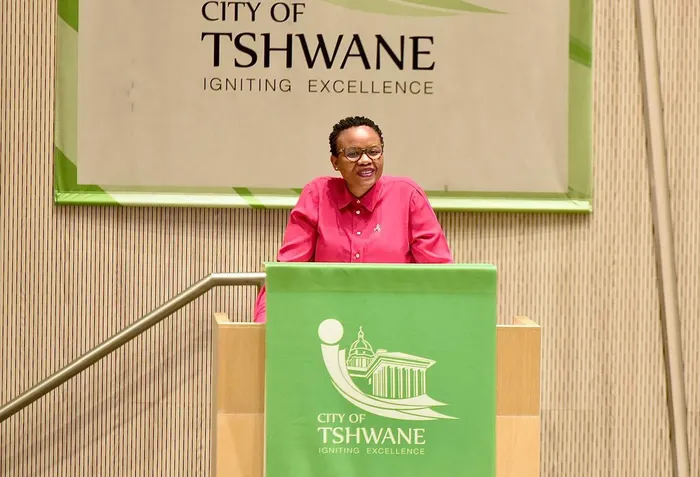Tshwane's unemployment crisis: Mayor Moya's vision for economic revitalisation

Mayor Nasiphi Moya wants to tackle youth unemployment through the Economic Revitalisation Strategy.
Image: Supplied / City of Tshwane
The City of Tshwane is facing a dire situation, with a staggering 37,8% unemployment rate, predominantly affecting young people.
This was highlighted by Mayor Nasiphi Moya at the launch of ActionSA's initiative at the Apartheid Museum this week, aiming to reshape South Africa's economic agenda for lasting change.
Despite the seemingly daunting challenge, Moya expressed confidence that the city's Economic Revitalisation Strategy can help reduce unemployment by growing the local economy to 3,9% by 2029.
She highlighted widespread poverty, service backlogs, and neglect in certain regions, as well as the marginalisation of informal settlements and townships from growth centers and essential services.
According to her, meaningful transformation requires tangible action in cities, making them more equitable, inclusive, and responsive to people's needs, rather than just relying on speeches and policy statements.
Since taking office in November last year, she emphasised the need to build a city that serves everyone, not just the privileged few, requiring a fundamental shift in investment, budgeting, and measuring success.
“Central to this is the implementation of a bold yet practical Economic Revitalisation Strategy to grow Tshwane’s economy to 3,9% by 2029. This strategy effectively gives expression to this party’s call for truly Inclusive Economic Empowerment. A policy proposal that advocates for the inclusion of all people who have been left out of the economy since 1994 and before,” she said.
Moya explained that the strategy is about creating jobs and restoring dignity, not just numbers on a spreadsheet.
“It is about people like a young woman from Hammanskraal, who dreams of finding work in a city that believes in her future,” she said.
The revitalisation strategy is built on six key pillars, which include investment attraction, infrastructure delivery, township and Small Micro Medium Enterprise development, innovation and skills, land and property activation and a more supportive regulatory environment
Moya said: “We are unlocking development corridors, fast-tracking high-impact projects, and putting city-owned assets to productive use – from Wonderboom Airport to the Tshwane Fresh Produce Market and the Rooiwal power station.”
Her administration, she said, aims not only to attract investment but also to ensure it is distributed more equitably
“The seven regions of our city were not created equal, and that inequality continues to shape people’s access to opportunity. That is precisely why true transformation must be both economic and spatial. We are rebalancing our city’s resources by budgeting based on need, not just proximity to wealth or power,” she said.
ActionSA expressed concern that 31 years into democracy, South Africa remains the world's most unequal country, with significant disparities in income, wealth and access to opportunities.